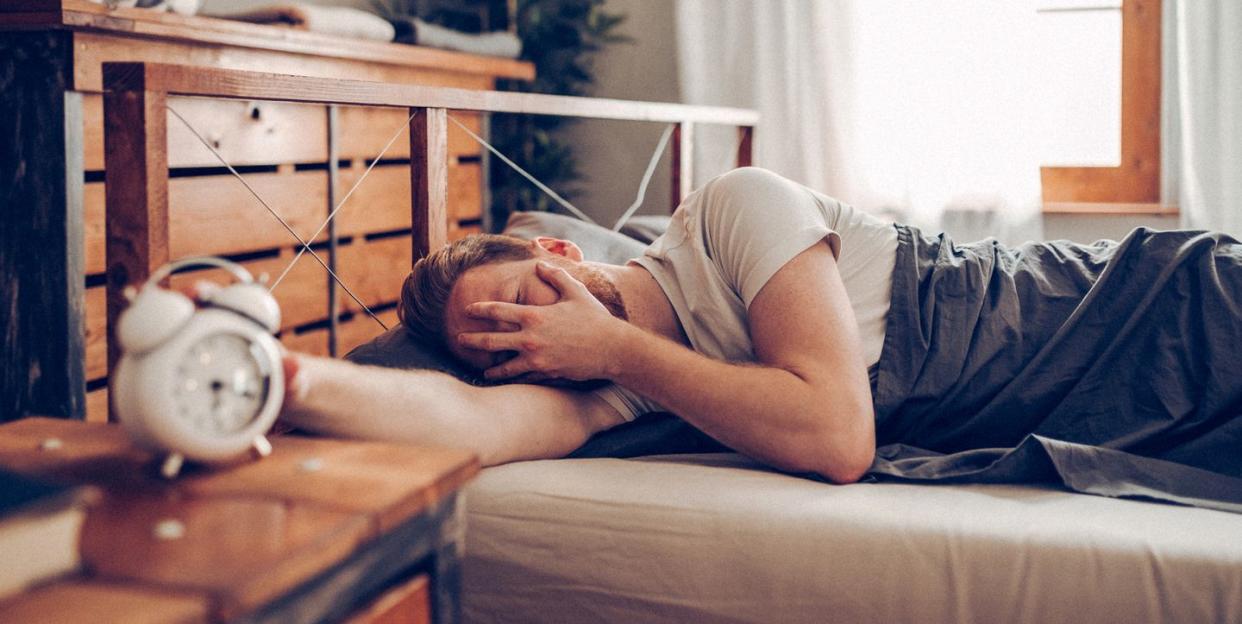Just 5 Days of Not Getting Enough Sleep Can Impact Your Everyday Thoughts

According to a new study published in the Journal of Sleep Research, it takes just five nights of only five hours of sleep per night to sour your everyday thoughts.
Getting enough sleep—about seven to nine hours per night—will not only increase your chances of feeling more positive, but it may also help with improved memory and workout performance.
Five nights of just five hours of sleep per night—that’s how long it takes to sour your everyday thoughts, new research suggests.
For the study, published in the Journal of Sleep Research, researchers recruited 42 people. Over a period of two weeks, the researchers recorded the people’s reactions to 90 images—which included pleasant, neutral, and unpleasant photos—after five nights of regular sleep. They then tested the participants’ reactions again after five consecutive nights of sleep restriction.
Participants confirmed before the study that they usually slept between seven to eight hours per night. They were also screened for the presence of mood or anxiety disorders, sleep disorders, and insomnia.
After the sleep restriction, there were significant increases in negative moods, along with decreased alertness, the study found. Most notably, participants were much more likely to rate pleasant and neutral images as negative. Researchers concluded that this is important because chronic sleep restriction is fairly common due to medical conditions, sleep disorders, work demands, and lifestyle issues.
Sleep is a universal need, and previous studies have highlighted serious cognitive and physiological consequences to disrupted or shortened sleep, lead author Daniela Tempesta, Ph.D., of the University of L’Aquila’s Department of Biotechnological and Applied Clinical Sciences, told Bicycling. This research shows there can be emotional effects as well, she said.
“Sleep seems to have a critical role in the different components of emotional processing, both in emotional memory and in emotional reactivity,” Tempesta said. She added that sleep loss can affect both of these, not only making people feel more negative in general, but also having negative emotional judgments.
Why does the amount of time asleep matter? Because a shorter duration often leads to less REM sleep, said Tempesta, which is the type you experience when dreaming. This is a sleep stage that occurs most in the second part of the night, and it’s when brain regions like the amygdala and hippocampus—both crucial for memory and emotion—do their processing of previously acquired emotional memories, shuttling them into long-term storage.
When this process is cut short, it can increase emotional reactivity when you’re awake, according to Tempesta. That means getting enough sleep—about seven to nine hours per night, according to the CDC—will not only increase your chances of feeling more positive, but it may also help with memory, she added. Not to mention, previous research suggests getting enough sleep can improve your athletic performance, too.
Although the study was done before the coronavirus pandemic, sleep experts are already concerned about the effect of sleep difficulties right now. For example, University of Chicago Medicine recently noted that sleep is essential for immune function, as well as mood, brain function, and energy—and that COVID-19 is likely contributing to a rise in anxiety-related sleep problems.
Your best bet? Employ some tried-and-true sleep strategies that are helpful even when there isn’t a global health crisis, such as establishing a consistent bedtime, limiting alcohol and caffeine, and keeping up an exercise routine.
You Might Also Like

